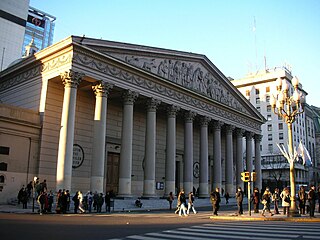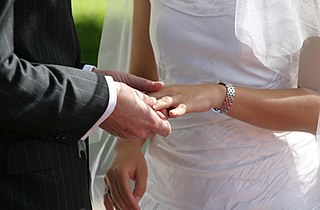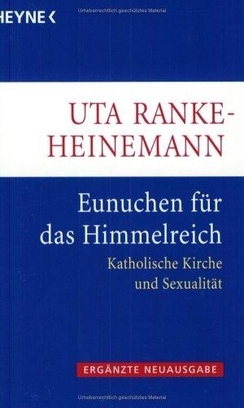
The Dicastery for the Doctrine of the Faith (DDF) is the oldest among the departments of the Roman Curia. Its seat is the Palace of the Holy Office in Rome. It was founded to defend the Catholic Church from heresy and is the body responsible for promulgating and defending Catholic doctrine.
Clerical celibacy is the requirement in certain religions that some or all members of the clergy be unmarried. Clerical celibacy also requires abstention from deliberately indulging in sexual thoughts and behavior outside of marriage, because these impulses are regarded as sinful. Vows of celibacy are generally required for monks and nuns in Christianity, Buddhism, Hinduism, Jainism and other religions, but often not for other clergy.

Marriage in the Catholic Church, also known as holy matrimony, is the "covenant by which a man and woman establish between themselves a partnership of the whole of life and which is ordered by its nature to the good of the spouses and the procreation and education of offspring", and which "has been raised by Christ the Lord to the dignity of a sacrament between the baptized". Catholic matrimonial law, based on Roman law regarding its focus on marriage as a free mutual agreement or contract, became the basis for the marriage law of all European countries, at least up to the Reformation.

The Argentine Catholic Church, or Catholic Church in Argentina, is part of the worldwide Catholic Church, under the spiritual leadership of the pope, the Curia in Rome, and the Argentine Episcopal Conference.
The canon law of the Roman Catholic Church requires that clerics "observe perfect and perpetual continence for the sake of the kingdom of heaven". For this reason, priests in Roman Catholic dioceses make vows of celibacy at their ordination, thereby agreeing to remain unmarried and abstinent throughout their lives. The 1961 document entitled Careful Selection and Training of Candidates for the States of Perfection and Sacred Orders stated that homosexual men should not be ordained. In 2005, the Church clarified that men with "deeply rooted homosexual tendencies" cannot be ordained. The Vatican followed up in 2008 with a directive to implement psychological screening for candidates for the priesthood. Conditions listed for exclusion from the priesthood include "uncertain sexual identity" and "deep-seated homosexual tendencies".

Angelo Scola is an Italian Cardinal of the Catholic Church, philosopher and theologian. He was Archbishop of Milan from 2011 to 2017. He served as Patriarch of Venice from 2002 to 2011. He has been a cardinal since 2003 and a bishop since 1991.

Pope Francis is the head of the Catholic Church, the bishop of Rome and sovereign of the Vatican City State. He is the only pope to be a member of the Society of Jesus (Jesuits), the only one from the Americas, the only one from the Southern Hemisphere, and the only one born or raised outside Europe since the 8th-century papacy of the Syrian Pope Gregory III.
Theology of the Body is the topic of a series of 129 lectures given by Pope John Paul II during his Wednesday audiences in St. Peter's Square and the Paul VI Audience Hall between September 5, 1979, and November 28, 1984. It constitutes an analysis on human sexuality. The complete addresses were later compiled and expanded upon in many of John Paul's encyclicals, letters, and exhortations.
Clerical celibacy is the discipline within the Catholic Church by which only unmarried men are ordained to the episcopate, to the priesthood in the Latin Church, and similarly to the diaconate. In other autonomous particular churches, the discipline applies only to the episcopate. According to Jason Berry of The New York Times, "The requirement of celibacy is not dogma; it is an ecclesiastical law that was adopted in the Middle Ages because Rome was worried that clerics' children would inherit church property and create dynasties."
The Catholic Church condemns same-sex sexual activity and denies the validity of same-sex marriage. While the Church says it opposes "unjust" discrimination against homosexual persons, it supports what it considers "just" discrimination in the employment of teachers or athletic coaches, in adoption, in the military and in housing. The Catechism of the Catholic Church promulgated by Pope John Paul II considers sexual activity between members of the same sex to be a grave sin against chastity and sees homosexual attraction as objectively disordered. However, the Catechism also states that homosexuals "must be accepted with respect, compassion, and sensitivity". This teaching has developed through papal interventions, and influenced by theologians, including the Church Fathers.

Sex and gender roles in the Roman Catholic Church have been the subject of both intrigue and controversy throughout the Church's history. The cultural influence of the Catholic Church has been vast, particularly upon Western society. Christian concepts, introduced into evangelized societies worldwide by the Church, had a significant impact on established cultural views of sex and gender roles. Human sacrifice, slavery, infanticide and polygamy practiced by cultures such as those of the Roman Empire, Europe, Latin America and parts of Africa came to an end through Church evangelization efforts. Historians note that Catholic missionaries, popes and religious were among the leaders in campaigns against slavery, an institution that has existed in almost every culture and often included sexual slavery of women. Christianity affected the status of women in evangelized cultures like the Roman Empire by condemning infanticide, divorce, incest, polygamy and marital infidelity of both men and women. Some critics say the Church and teachings by St. Paul, the Church Fathers, and scholastic theologians perpetuated a notion that female inferiority was divinely ordained, while current Church teaching considers women and men to be equal, different, and complementary.

Robert Sarah is a Guinean prelate of the Catholic Church. A cardinal since 20 November 2010, he was prefect of the Congregation for Divine Worship and the Discipline of the Sacraments from 23 November 2014 to 20 February 2021. Sarah previously served as secretary of the Congregation for the Evangelization of Peoples under Pope John Paul II and president of the Pontifical Council Cor Unum under Pope Benedict XVI.

Mario Aurelio Poli is an Argentine prelate of the Catholic Church who was the Archbishop of Buenos Aires from 2013 to 2023. He was the Bishop of Santa Rosa from 2008 to 2013 and before that an auxiliary bishop in Buenos Aires from 2002 to 2008. Pope Francis, his predecessor in Buenos Aires, made him a cardinal in 2014.

Eunuchs for the Kingdom of Heaven – The Catholic Church and Sexuality is a philosophical book by the German theologian Uta Ranke-Heinemann, first published in 1988 and translated in 1990. The book is about how sexual morality is governed by celibates in the Catholic Church, which she criticizes as misogynous. While this work represents a late 20th century view, and remains broadly relevant, in some areas material has become dated, as Pope Francis began to address some of the issues raised in this work in the early 21st century.
The Christian tradition has generally proscribed any and all noncoital genital activities, whether engaged in by couples or individuals, regardless of whether they were of the same or different sex. The position of the Roman Catholic Church with regards to homosexuality developed from the writings of Paul the Apostle and the teachings of the Church Fathers. These were in stark contrast to contemporary Greek and Roman attitudes towards same-sex relations which were more relaxed.

Víctor Manuel Fernández is an Argentine prelate of the Catholic Church and a theologian. He is currently the head of the Dicastery for the Doctrine of the Faith.

Pope Francis, the head of the Catholic Church since 2013, has marked a significantly more accommodative tone on LGBT topics than his predecessors. In July 2013, his televised "Who am I to judge?" statement was widely reported in the international press, becoming one of his most famous statements on LGBT people. In other public statements, Francis has emphasised the need to accept, welcome, and accompany LGBT people, including LGBT children, and has denounced laws criminalising homosexuality. While he has reiterated traditional Catholic teaching that marriage is between a man and a woman, he has supported same-sex civil unions as legal protections for same-sex couples. Under his pontificate, the Dicastery for the Doctrine of the Faith has confirmed that transgender people can be baptised, and allowed the blessing of same-sex couples in the document Fiducia supplicans. Francis has privately met many LGBT people and activists. In 2013, Francis was named as Person of the Year by The Advocate, an American LGBT magazine.

The Two Popes is a 2019 biographical drama film directed by Fernando Meirelles and written by Anthony McCarten, adapted from McCarten's play The Pope which premiered at Royal & Derngate Theatre in 2019. Predominantly set in Vatican City in the aftermath of the Vatican leaks scandal, the film follows Pope Benedict XVI, played by Anthony Hopkins, as he attempts to convince Jorge Mario Cardinal Bergoglio, played by Jonathan Pryce, to reconsider his decision to resign as an archbishop as he confides his own intentions to abdicate the papacy.

Pope Francis has had main contacts with those of other Christian faiths, with those of other religious beliefs, and with non-believers.

The Pope Francis bibliography contains a list of works by Pope Francis.















